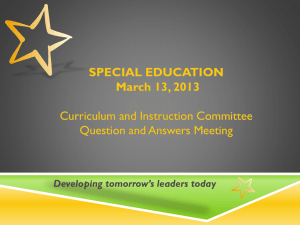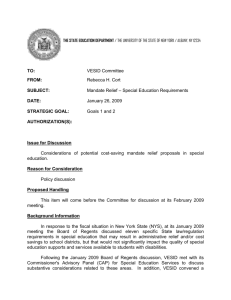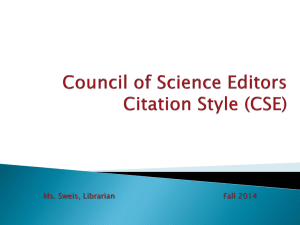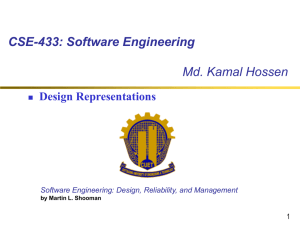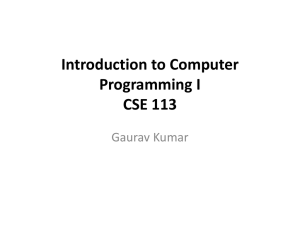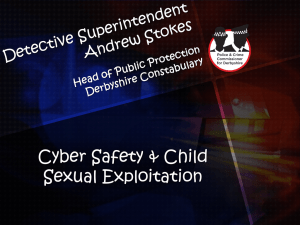Transition to CPSE to CSE
advertisement
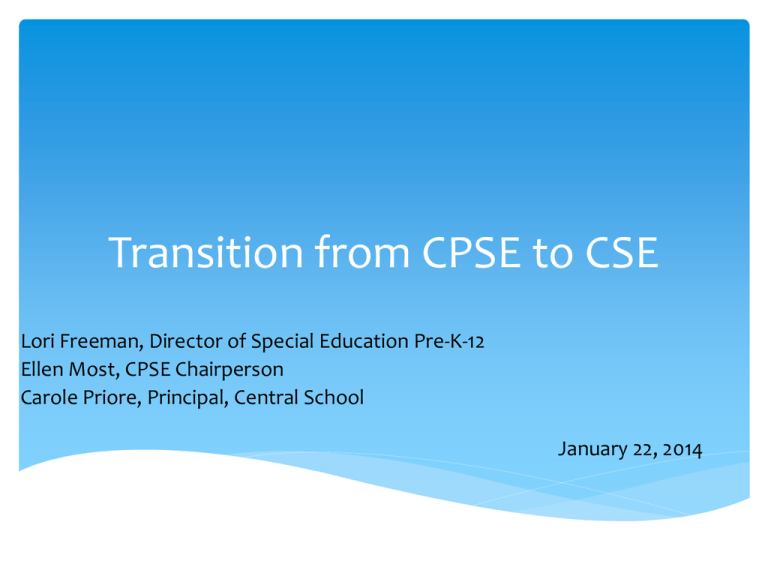
Transition from CPSE to CSE Lori Freeman, Director of Special Education Pre-K-12 Ellen Most, CPSE Chairperson Carole Priore, Principal, Central School January 22, 2014 Transition Planning o Some children currently receiving Preschool Special Education Services will: move to Special Education services under the Committee on Special Education (CSE). others who no longer need specialized services will be declassified. regardless of what programming decisions are made, transition planning will be part of your child’s final annual review under CPSE. o Transition planning will include: A review of your child’s progress Identification of community resources needed by and available to you and your child A determination whether your child will be referred to Committee on Special Education (CSE) Timelines to ensure continuity of services Clarification about how information will be passed from CPSE to CSE A determination of whether services will be 10 or 12 months Steps to help your child adjust to a new setting If you have questions and concerns about your child’s transition planning process, you can share these concerns with Ellen Most, CPSE Chairperson or Lori Freeman, Director of Special Education PreK-12 2 Continuity of Services Your child’s transition from CPSE to CSE occurs the year they turn 5 prior to December 31st. For example: Your child turns 5 on December 28—your child will be eligible for Kindergarten services in September of the year prior to their 5th birthday. Your child turns 5 on or after December 31—your child is not eligible for Kindergarten until September of the following year. What will happen: This meeting is the beginning of the process for your child The CPSE refers your child to the school districts’ Committee on Special Education if services need to continue. We will discuss how best for you to prepare. School personnel will observe your child conduct any necessary evaluations and discuss recommendations with teachers and therapists for the upcoming year. 3 Continuity of Services In the Spring, formal reviews are held by your school district with you the parent. You may have one or possibly two meetings to discuss your child’s educational information. The CPSE will hold its annual review to discuss progress made during the year. 4 Preschool Exit Assessments Preschool children with a disability who stop receiving preschool services due to program completion or declassification will be given an exit assessment. Information from the exit assessment is part of the discussion at the child’s annual CPSE meeting. Information is gathered in the following three areas as part of the exit assessment: Positive social-emotional skills, including social relationships Acquisition and use of knowledge and skills including early language/communication and early literacy Appropriate behaviors to meet their needs The exit assessment is not an assessment of your child, it is an assessment of the program. The purpose of the exit assessment is to determine the effectiveness of the child’s past program placement. 5 Student Moving to CSE The CPSE is required to notify the Board of Education(BOE) that your child is eligible for Special Education services under the Committee on Special Education, CSE. An observation along with a review of information arranged by CPSE and possibly new evaluations will be conducted on your child. Information will be shared with you and the team. 6 Student Moving to CSE The following is the process that will occur: CPSE will review evaluation findings and determine: Student is no longer in need of Special Education services Declassification and Exit Student is eligible for Special Education services and referred to a Committee on Special Education 7 Student Moving to CSE The Committee on Special Education will: Determine eligibility for CSE services Develop and Individualized Education Plan (IEP) Discussion of Free Appropriate Public Education (FAPE) Arrange for delivery of programs/services Type Duration Frequency Location Identify the Least Restrictive Environment for your child (LRE) Discuss 10 month vs. 12 month programming to prevent substantial regression Discuss a Functional Behavioral Assessment if needed. 8 Committee on Special Education The members of the CSE can include but is not limited to the following individuals: The parent(s) of the student One general education teacher One special education teacher or if appropriate a special education provider School psychologist Representative of the school district An individual who can interpret evaluation results School physician–if requested People who you invite 9 Committee on Special Education Additional information about the CSE: Each school district in NYS must have a Committee on Special Education (CSE) just as it is required to have a Committee on PreSchool Education (CPSE) The CSE reviews information prior to the child’s annual review and determines if the child will continue to receive services under CSE. If it is determined that your child is no longer eligible, the CPSE must inform the family prior to the annual meeting of CPSE intent to declassify. The CSE develops an Individualized Education Program (IEP) if your child is determined eligible. 10 Eligibility For CSE Eligibility for CSE is: Based on an individual evaluation in your child’s native language Determined by a multidisciplinary team Dependent on multiple sources of information including: Interview Observation Evaluations 11 Eligibility For CSE Areas included in the evaluation: For children being declassified an evaluation must be conducted. However evaluations do not always need to be completed for children who are moving from CPSE to CSE as a review of current information is appropriate. 12 Eligibility For CSE The following information is reviewed Adaptive—self-help in areas, ex. dressing and eating Cognitive—thinking, figuring things out, problem solving Motor—moving fine muscles development like grasping Speech and Language—talking, understanding and communicating Social Emotional—getting along with others, coping 13 Eligibility For CSE New York State Education Department has established 13 classifications that lead to CSE eligibility. There are specific criteria for meeting each classification. Autism Multiple Disability Deafness Orthopedic Impairment Deaf Blindness Other Health Impairment Emotional Disturbance Traumatic Brain Injury Hearing Impairment Speech and Language Impairment Intellectual Disability Visual Impairment, including blindness Learning Disability 14 Evaluations An evaluation is a careful examination of a child’s skills, strengths and weaknesses to determine: current levels of functioning how best to plan for your child. What can he do? What does she like to do? What kinds of things should he/she be encouraged to do next? 15 Evaluations If additional information is needed the CSE may ask for the following information to help determine CSE eligibility and for developing the most appropriate IEP (Individualized Education Program). Physical examination Individual psychological evaluation Social history Observation of your child in the student’s learning environment Possible assessments for: Speech Occupational Therapy Physical Therapy Other appropriate assessments, such as a Functional Behavioral Assessment (FBA) this is a mandated evaluation component for a child whose behavior impedes or affects his/her learning or that of others. 16 Parent as a Team Member The laws about Special Education identify parents as members of the CSE. The CSE is responsible for creating the Individualized Education Program (IEP) which is designed to identify the programs and services to meet your child’s educational needs. Your child's IEP is developed by a team that includes: you, the parent an administrator from the district teachers (general and special education) an evaluator, an individual who can interpret the evaluation results people that you feel have information on your child. Parents must put a request in writing to the committee that they will bring an additional person to the meeting. That is quite a crowd! 17 Parent as a Team Member The district will help you feel part of the team: Give you at least 5 days notice about where and when the meeting will be held; The Invitation will include the individuals attending the meeting Reschedule the meeting if it is inconvenient for you to attend (let them know as soon as possible); Let you know what will be discussed at the meeting; Provide copies of reports and a Draft IEP 18 Preparing for the Meeting Before your child’s CSE meeting think about your answers to the questions below: Are there aspects of your child's behavior that you believe interfere with learning? If so what? What are your child's strengths and weaknesses? What methods have you found to be effective in supporting your child’s growth and development? How well does your child interact with other children their age? 19 Preparing for the Meeting You should leave the meeting with a clear understanding of: Your child's strengths and weaknesses The goals that will be worked on for the school year The methods and services that will be used to reach these goals How the teacher/therapists will keep you informed about your child’s progress 20 Continuum of Services for Students The Continuum of Programs/Services may include: Related Services only; i.e. Speech and Language Consultant Teacher Services Resource Room Integrated Co-Teaching Special class Other placements outside of the district 22 Declassification for Some Students Some children may no longer need an IEP under Special Education Services. For those children there is a process identified as declassification. Questions that you as a parent may be asking yourself as your child approaches the end of Preschool Special Education: What is declassification? How does declassification happen? Who decides if my child will be declassified? What should I do if my child begins to struggle once he/she is in school? 23 Declassification for Some Students Declassification can be a wonderful opportunity for your child. It indicates that your child has made progress and he/she no longer requires services under CPSE or CSE. If a child is recommended for declassification, a process MUST be followed. This process includes the following components: The CPSE reviews existing evaluation data as part of the reevaluation process and identified what if any additional data is needed. The CPSE has the responsibility to arrange for additional assessments by an approved evaluator selected by the parent The results must be provided to the CPSE, the parents and the municipality The CPSE must review the reevaluation and assessment results and determine the child's progress rating in each of the three outcome areas Most children who are declassified under CPSE do extremely well 24 in kindergarten Tips for Parents You are an excellent source of information about your child. Your input to your child’s program is valuable and important. A team approach, in which you and the school are working together, is the BEST approach. Keep in contact with your child’s teacher on a regular basis. Informal conversations or notes are an excellent way to stay informed and establish a relationship with your child’s teacher. 25 Tips for Parents When your child talks about school. Pay attention to his/her feelings and to behavior changes, that may be early signs that something is wrong. It is also great to share the positive changes or observations with the school. It is always helpful to keep good records. Organize folders or boxes early so that you have a place to store medical records, written reports, test results, etc. This will help you later when you need them. Try to meet and talk to other parents. Get to know parents through informal talks or by joining parent groups at your school or community; i.e. PTA and SEPTA. Other parents are a wonderful source for support and information. 26 QUESTIONS Contact Information: Ellen Most: 914-220-3074 emost@mamkschools.org Lori Freeman 914-220-3060 lfreeman@mamkschools.org 27 Special Thanks to: The Early Childhood Direction Center Syracuse University

